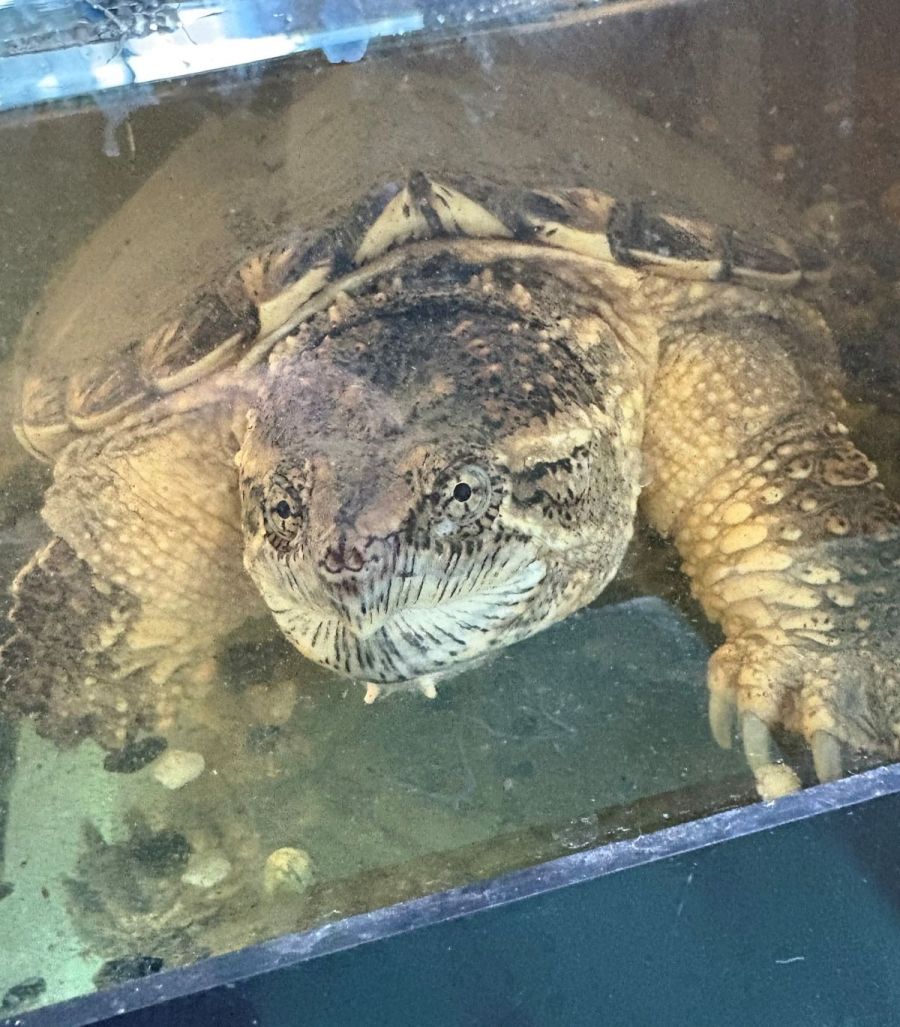Search KamloopsBCNow
- Food & Drink
- Biz+Tech
- Columns
- Travel & Lifestyle
- Arts & Culture
- News & City Info
- Events
- Webcams
- Advertise
- Real Estate
- Contests
- Best Of the city
- Faces of Kamloops
- More
- Real Estate Listings
- Subscribe
- Contact
Early in the summer, the team at the Scout Island Nature Centre in Williams Lake were visited by Conservation Officers and was handed a turtle.
The officers named the turtle Travis and identified it as a common snapping turtle, a species native to areas in the United States and Canada east of the Rocky Mountains.
According to the Ontario Turtle Conservation Centre, common snapping turtles are the largest freshwater turtle native to Ontario.
In BC, common snapping turtles are invasive and categorized as a Provincial Containment species, meaning their presence in the province is limited, but there is significant potential for them to spread.
"I don't know how he came to Williams Lake," said Lara Roorda, manager at Scout Island. She was told Travis was found in an alley near Ninth Avenue.
.jpg)
Individual snapping turtles have been reported around BC in the past, introduced to the province through the pet trade. Recently, however, some were found laying eggs in a small water body near Port Alberni.
"If established in BC, snapping turtles could impact native species, including Western painted turtles and other aquatic and semi-aquatic species, through predation and competition," said the Ministry of Water, Land and Resource Stewardship in an email to the Tribune.
For this reason, the province is working on an eradication project, which will include public education and an outreach campaign.
Measuring around five or six inches across, Roorda compared Travis's size to that of a large painted turtle, more familiar to the waters of Williams Lake.
“Turtles do not make a good pet because they grow big and live forever,” Roorda said. Scout Island isn't set up to house a snapping turtle, and so Travis has been temporarily cared for by the team there until a proper home could be found.
As an animal native to Canada, possessing a common snapping turtle requires a permit, and it can be complicated to get one.
“It is illegal to take any wildlife out of its Indigenous environment and keep it as a ‘pet’,” said Sharon Doucette, executive director of Urban Safari Rescue Society based in Surrey. The animal rescue is home to over 350 exotic animals and Doucette said it is the only charity in B.C. dedicated to the rescue and sanctuary of exotic animals.
Doucette was contacted by Scout Island to see if Urban Safari could take care of Travis. She said they get multiple phone calls every week from people across the province trying to help animals find a home, and they often have to say no. Luckily, Urban Safari already has a permit to possess a common snapping turtle, and the enclosure needed to give it a good home.
“I’m just happy that we’re able to take it,” Doucette said.

Being native to Canada, these snapping turtles are adapted to the northern climate and so can survive in outdoor enclosures.
Doucette said Travis will have to be re-acclimatized to the outdoors so the turtle can live and grow in the pond, which housed previous snapping turtles in their sanctuary.
Turtles have a slow metabolism, she said, and it becomes slower as they grow older.
As a younger turtle, Travis will be fed pieces of raw meat about once every week or two, though it will go into a sort of hibernating state through the winter.
"It will be comfortable here," Doucette said.
Sue Burton, a wildlife volunteer local to Williams Lake, will be transporting Travis to Urban Safari at the end of September. Until then, the turtle continues to be cared for by volunteers at Scout Island.
"He's really cool," said Roorda. "A little bit prehistoric."
Throughout the summer, community members have been visiting the turtle and helping to feed it by catching grasshoppers and earthworms.
The children, Roorda said, love to watch Travis eat, his neck stretching out long as he snaps up his prey.
As summer comes to an end, the Scout Island Nature House has returned to its off-season hours. Visit Travis before the turtle's departure when the centre is open on Saturdays and Sundays from noon to 3 p.m.